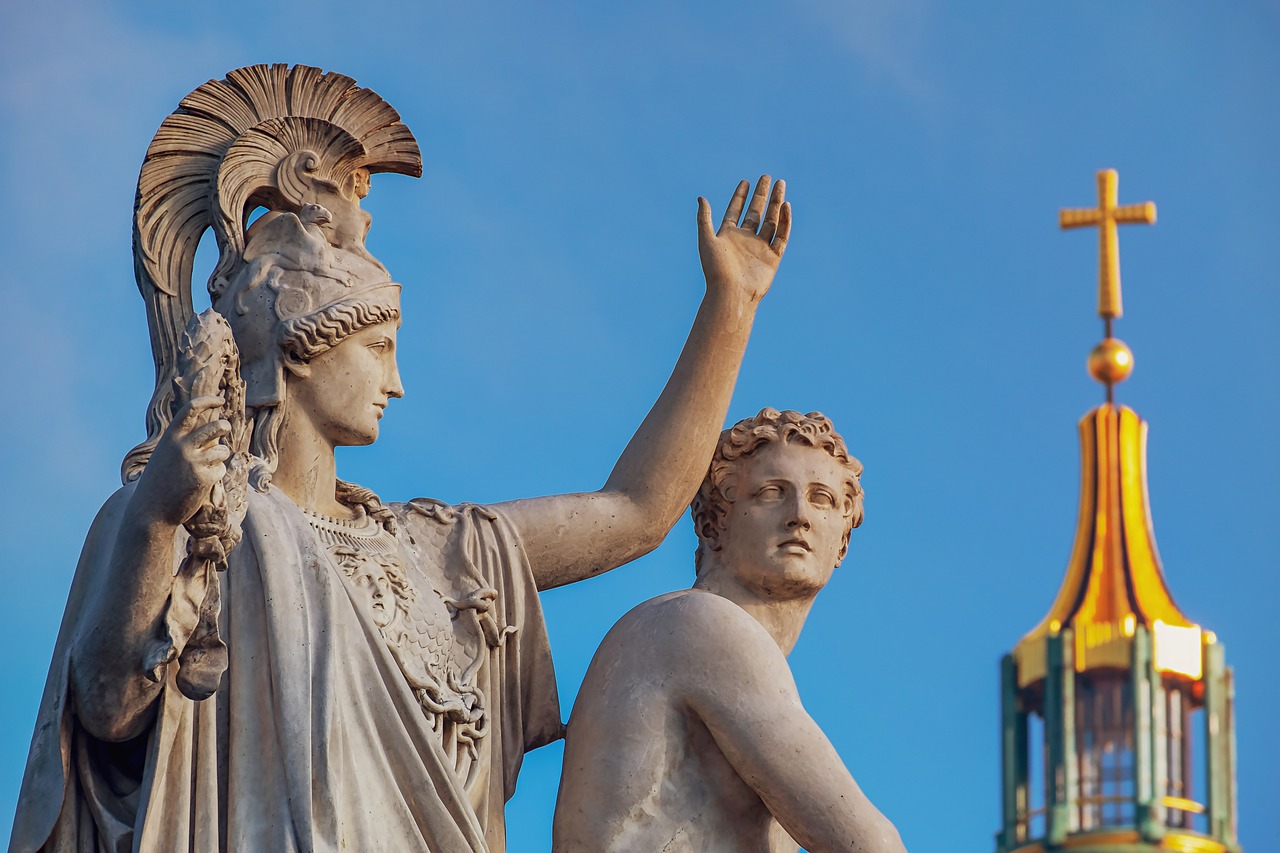Zeus: The Supreme Olympian God
Zeus, known as the King of the Gods, presides over the realms of the sky, weather, law and order, and kingship. He is generally portrayed as a dignified and mature figure, distinguished by a robust build and a prominent dark beard. His classic symbols include a formidable lightning bolt, a royal sceptre, and an eagle.
Mythology and Origins
Zeus was the youngest offspring of the Titans Kronos and Rheia. Kronos, fearing that his children would overthrow him, devoured each of them at birth. However, Rheia managed to save Zeus by concealing him on Mount Dikte in Crete, presenting Kronos with a stone wrapped in swaddling clothes. During his secret upbringing, he was nurtured by nymphs with milk from the goat Amaltheia and safeguarded by the Kouretes, who masked the sound of his cries with their battle cries.
Upon reaching maturity, Zeus allied with the goddess Metis, who provided Kronos with a potion causing him to regurgitate the siblings he had swallowed. In gratitude for his rescue, the Kyklopes equipped him with lightning bolts, while the Hekatonkheires provided massive support during his battle with the Titans. After vanquishing Kronos and his allies, Zeus, alongside his brothers, divided sovereignty over the cosmos, claiming dominion over the heavens.
Fearing a prophecy that Metis’s child would dethrone him, Zeus swallowed her when she became pregnant. Athena later emerged from his head, fully grown and armored. Zeus subsequently married his sister Hera, who became the queen of the heavens, though their union was marked by frequent disputes.
Zeus’s narrative is also intertwined with the creation of mankind; Prometheus fashioned humans and stole fire from the gods for them, leading Zeus to enact a penalty by sending Pandora, the first woman, to unleash woes upon mankind. After witnessing moral decay among humans, Zeus contemplated purging them through a great flood. However, Deukalion and Pyrrha survived and were instructed to repopulate the earth by casting stones that transformed into humans.
Symbolism and Attributes
Zeus’s principal symbol is the lightning bolt, representative of his power. He also possesses a royal sceptre, a throne, and is often depicted with an eagle, alongside a small figure of Nike, the goddess of victory. His attire typically includes a long robe and a cloak, although he is sometimes portrayed nude. An olive wreath is a common decoration depicting his nobility.
Sacred Animals and Flora
The eagle and the bull are sacred to Zeus, reflecting his divine nature. In myth, he abducted Ganymede in the form of an eagle and Europa as a bull. His sacred trees include the holm oak and the olive tree, with the latter being significant in the tradition of crowning victors at the Olympic Games.
Retinue of Zeus
As the chief of the gods, Zeus is surrounded by a host of lesser deities. His throne is attended by four winged spirits representing Strength, Rivalry, Victory, and Force. Hermes serves as his messenger, while Iris, the rainbow goddess, conveys messages among the deities. Themis, the goddess of law, helps Zeus govern the cosmos alongside her daughters, the Moirai (Fates) and the Horai (Seasons). His virgin sister Hestia maintains the sacred hearth in his palace, and Metis, swallowed by Zeus to retain his power, resides within him, symbolizing wisdom.
Ganymede and the goddess Hebe serve as Zeus’s cupbearers at divine feasts, while the Harpies are tasked with punishing mortals at Zeus’s behest. Furthermore, Pegasos, the winged horse, is renowned for carrying Zeus’s lightning bolts.
Family and Relationships
Zeus descends from the Titans Kronos and Rheia, continuously intertwining with the lives of other gods and mortals. He has a complex family tree including several notable offspring from both divine and mortal unions. His children range from divine deities such as Ares, Hebe, and Eileithyia, to mortal heroes like Perseus and Herakles.
Zeus’s roles often blur the lines between authority and familial interests, influencing many myths surrounding love and conflict.
Conclusion
In summation, Zeus embodies the apex of divinity within Greek mythology, commanding respect and fear across the realms. His wielder of thunderous power and law dictates not just the fate of gods but also the lives of mortals. Understanding Zeus grants insight into the intricate interplay of human attributes and the vast powers of nature.



